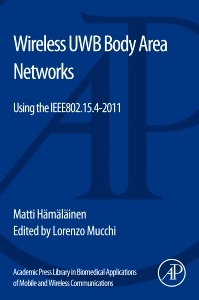Description
Academic Press Library in Biomedical Applications of Mobile and Wireless Communications: Wireless UWB Body Area Networks
Using the IEEE802.15.4-2011
Author: Hamalainen Matti
Coordinator: Mucchi Lorenzo
Language: English
Subjects for Academic Press Library in Biomedical Applications of...:
Approximative price 27.11 €
In Print (Delivery period: 14 days).
Add to cart48 p. · 15.2x22.8 cm · Paperback
Description
/li>Contents
/li>Readership
/li>Biography
/li>Comment
/li>
Wireless sensor and body area networks (WSN and WBAN respectively) have been seen as a future way to monitor humans’ psycho-physiological signs remotely. There are a number of standards that could be used for building WBAN sytems. However, wireless UWB networks based on IEEE 802.15.4a offer the advantages of a large frequency range and low power spectral density, making it suitable for both WSNs and WBANs used for medical applications. The technology has matured sufficiently that it can be used to develop products for the marketplace. This book presents how the IEEE802.15.4-2011 (former IEEE802.15.4a) can be used in wireless body area networks (WBAN) for healthcare and welfare related applications. It gives a short overview on the IEEE802.15.4 family and then gives details of IEEE802.15.4-2011 based solutions.
- Presents how the IEEE802.15.4-2011 (former IEEE802.15.4a) can be used in wireless body area networks (WBAN) for healthcare and welfare related applications.
- Gives a short overview on the IEEE802.15.4 family.
- Gives details of IEEE802.15.4-2011 based solutions.
1. Introduction 2. IEEE802.15.4 standard family 3. Applications 4. IEEE802.15.4a based WBAN 4.1 IEEE802.15.4a IR-UWB properties 4.2 Different receiver structures for IEEE802.15.4a/IEEE802.15.4-2011 4.3 Energy efficiency 5. WBAN channel modeling 5.1 IEEE802.15.4a standard channel model 5.2 Hospital WBAN channel model 5.3 Other channel model impacts 6. Performance analysis for different receiver structures 7. Conclusion 8. References 9. Appreviations
In 1993 he was the co-author of a seminal review article on MEG in Reviews of Modern Physics, now with more than 4000 citations. His current research interests include further development of anatomically-constrained MEG/EEG source estimation methods, including sparse and temporally continuous approaches, combination of non-invasive and invasive electromagnetic source imaging with hemodynamic measures, MEG/EEG studies of early brain development in infants, and adapting and extending MEG/EEG analysis methods to be applicable in real time in clinical neurophysiology studies.
Lorenzo Mucchi is an assistant professor at the Dept. of Information Engineering of the University of Florence, Italy, where he teaches Information Technologies. Lorenzo's main research areas include theoretical modelling, algorithms design and real measurements, mainly focused in the following fields: ultra wideband signals, localization and tracking, interference/channel modelling, intrinsic wireless security, adaptive diversity techniques and wireless healthcare. Lorenzo is senior member of the Institute of Electrical and Electronics Engineers (IEEE) and permanent member of the International Association of Science and Technology for Development (IASTED) Technical Committee on Telecommunications. All details are available at: http://lenst.det.unifi.it/~mucchi/
- Presents how the IEEE802.15.4-2011 (former IEEE802.15.4a) can be used in wireless body area networks (WBAN) for healthcare and welfare related applications.
- Gives a short overview on the IEEE802.15.4 family.
- Gives details of IEEE802.15.4-2011 based solutions.
These books may interest you

Microwave Sleep Apnoea Monitoring 158.24 €



